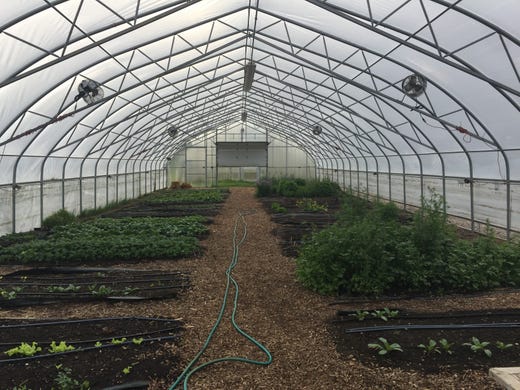School Gardens Take Root In Metro Detroit As Labs For Learning
In Detroit, students learn hands-on lessons about food, nutrition, and environmental science through school garden programs.
Join our corps! Applications for 2026-2027 are now open. Apply by March 30.
In Detroit, students learn hands-on lessons about food, nutrition, and environmental science through school garden programs.


Maureen Feighan, The Detroit News
The Detroit Public Schools Community School District has one of the most extensive school garden programs not just in Metro Detroit, but across the state.
Eighty-two of the district’s 106 school buildings have their own beds for vegetable and herb gardens this year. And plans are moving forward to make sure every school has its own beds, said Matt Hargis, the district’s Farm-to-School Program Supervisor.
Drew Farm, a two and a half-acre farm located at the Drew Transition Center on the city’s west side, meanwhile, hosts dozens of field trips each school year where kids tour the farm and get to see food actually being grown for their own school lunches. Inside a hoop house that students tour, radishes, bok choy, lettuce and kale are growing.
Hargis said he also likes to grow unusual plants like rice and ginger to expose students to plants and foods they might be unfamiliar with.
“It’s a way to show kids different types of things,” said Hargis.
But each of the individual school garden beds have to be tended and that takes work.
Charlotte Gale is one of four FoodCorps Americorps Service Members currently working in the district to teach kids about nutrition, garden education and “get them excited about food,” she said.
Assigned to David L. Mackenzie Elementary-Middle School for nearly two years, she’s done everything from school-wide taste tests for students with various fruits and veggies (grapefruit did not go over well with the kindergartners) to science lessons. Soon, flower beds will be installed near the garden to teach students about pollinators.
Pointing out the lettuce, broccoli, collards and eggplant taking roots in Mackenzie’s six raised beds, Gale said there’s no question the garden has taken something that can be abstract and made it tangible.
“When they (students) can see it go from a seed to an actual plant is pretty magical,” said Gale.

FoodCorps Welcomes Inaugural Cohort of Kindred Fellows

Dohmen Company Foundation Announces $4M Investment in FoodCorps

FoodCorps Urges Protecting Child Nutrition Amid Shutdown